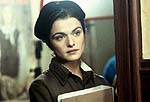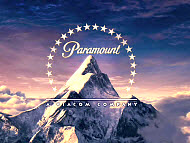Enemy at the Gates
 for strong graphic war violence and some sexuality.
for strong graphic war violence and some sexuality.
Reviewed by: Carole McDonnell
CONTRIBUTOR
| Moral Rating: | Average |
| Moviemaking Quality: |
|
| Primary Audience: | Adults |
| Genre: | Romance Drama |
| Length: | 2 hr. 26 min. |
| Year of Release: | 2001 |
| USA Release: |

| Featuring |
|---|
| Jude Law, Joseph Fiennes, Rachel Weisz, Ed Harris, Bob Hoskins |
| Director |
|
Jean-Jacques Annaud |
| Producer |
| John D. Schofield, Jean-Jacques Annaud |
| Distributor |

Somewhere in the middle of the film “Enemy at the Gates,” the film-going experience turned sour. I began viewing this film with a jaundiced eye. In short, I did not believe what I was seeing. A bad turn of events for a movie that is based on a true story.
“Enemy at the Gates” is the story of one of Russia’s great war heroes, Vassili Zaitsev, (Jude Law) a sharp-shooting military-sniper whose talent at killing Nazi officers helped revitalize the demoralized Russian Army. His skill was needed just when it seemed that the Germans—the enemies at the gates—would over-run Stalingrad. Vassili is an uneducated shepherd boy from the Urals who was taught to shoot by his grandfather, is drafted into the Russian army, finds love and becomes a national hero and object of worship.
A story of a warrior-farm boy who saves his country is wonderful enough. But Hollywood is Hollywood and tinseltown has never been able to leave a true story as it. A little embellishment is necessary, perhaps. (we’ve seen what they do with the story of David, another warrior farm-boy.) Hollywood pads even the most heroic stories with Hollywoodisms. It is not enough that Vassili is a sharp-shooter; he must be an uneducated sharp-shooter. Nor is it enough that the real Vassili had a girlfriend, Tanya (Rachel Weisz) who was a soldier, he is provided with a Jewish girlfriend who speaks German, who is a shooter in the militia and whose parents have been murdered by the Nazis. (They have a passionate clinch at one very dangerous moment, I could only look on in disbelief.) Such standardized cliched embellishments can only turn a viewer off.
Here are a few more examples: Vassili is given a Jewish intellectual propagandist friend, Daniloff, (Joseph Fiennes) to tout his glory Why? To provide a rival in Vassili’s love for Tanya. Why else? To say something about politics and race and the corruption of the Russian military. Why else? To provide us with the noble sacrificial/wistful death of an intellectual. It is annoying how Hollywood always create non-religious Jews whose intellectualism is their religion. We know this guy will turn out badly because he has those unromantic intellectual glasses that Jewish intellectuals always wear. The character leaves the movie-viewer feeling slightly uneasy. One wonders if the moviemakers were anti-semitic, or didn’t want to create religious characters. Other cliches abound: the Nazis are impeccably well-dressed, dignified and aristocratically cold. If I recall my history, the Nazis hated the aristocrats. And they were not a noble classy bunch, but a set of cruel thugs who happened to make it to power. it’s cliches like this that distances the filmgoer from the film. The strangest relationship—unbelievable, at best—involves the story of a child named Sasha.
This is not to say that the film won’t be liked. It’s a story of heroism and people like stories of soldiers and courage. The courage of warfare is more implied than seen, however. Most of the soldiers are pawns doing what they have to do… or they’ll get killed… by the Nazis and their own officers. There are a lot of battle scenes, mainly of Russian soldiers being gunned down. The war seems to have been won by intellectual propagandist and a noble sharp-shooter but not by the common soldiers.
The character of Vassili is shown as a humble, gentle being whose talent happens to be killing and who came into the kingdom at the right time in order to save his people. His actions encourages his fellow countrymen. But we never see what his fellow countryman does. They “believe” in Russia because of him and sign up to fight the enemy. But we never see them doing anything. Vassili’s prowess also gains him enemies, namely the cold aristocratic Nazi sharp-shooter, Konig (played by Ed Harris.) I am reminded of the insight given to believers in the story of the Seven sons of Sceva in the book of Acts. The “demonic” media is aware of Paul: “Paul, I know and Jesus I know. But who are you?” it’s good to be so powerful a force that even the enemies take notice.
As Christians, we are told to look upon whatever is true, honest, lovely and of good report. We are told to imitate that which is good. The Bible itself is full of warriors and we are told to be good soldiers of the Lord. The films shows us what a good soldier does. But we also see how the act of spinning the hero’s tale can turn into manipulation. Wars and Rumors of wars inspire, yes… but in the hand of a spin-meister propagandist, the hero becomes more than human. The hero becomes part of a greater game-plan whether or not he wishes to be. Vassili has to face his own press. It is the lot of the hero to be known. It is the nature of greatness to be praised and publicised. But, as we see in this Hollywood version of a “true story”, even the best and truest story—for good or evil—gets padded for human consumption. And who knows? Maybe Hollywood knows more about its audience than we do. After all, who would go to see a story of a heroic sharp-shooter if the film only told the bare—undressed up story?
The title of the film is taken from the Biblical verse: “Children are a heritage of the Lord and the fruit of the womb is His reward. Happy is the man who has his quivers full of them, for they will speak with the enemies in the gates.” A very ironic phrase, considering how youthfulness and innocence are used in the film.


[Very Offensive / 4½]
[Average / 3]
[Average / 3½]
[Average / 4]
[Better than Average / 2½]
[Extremely Offensive / 2]
[Better than Average / 4½]
[Better than Average / 4]
[Better than Average / 5]
[Average / 5]
[Average / 4½]
[Average / 3]
[Average / 4½]
[Very Offensive / 2]

My Ratings: [Better than Average / 4½]